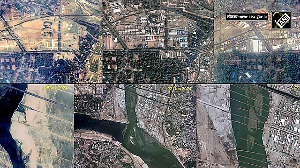Repeated calls for 'Jasmine Strolls' in Chinese cities, including Beijing, emanating from overseas Chinese web sites have added to the nervousness of the Chinese authorities.
A Jasmine Stroll is a stroll undertaken by those responding to the calls at pre-indicated places at pre-indicated timings to quietly demonstrate, without shouting slogans, their demand for the end of the rule of the Chinese Communist Party and for democracy and human rights.
The purpose of the strolls is not to indulge in any noticeable protest activity, but just to get out into the streets in large numbers and take a stroll as a silent mark of their demands.
Two such calls have so far been issued -- the second one being for Jasmine Strolls on February 27.
Nervous Chinese authorities deployed the police and officials of the Ministry of Public Security in large numbers in different cities. While there were no unusual crowds in the streets in addition to the usual Sunday strollers, the authorities have been rounding up suspicious persons for interrogation.
It has been reported that among those who took a stroll at the pre-indicated time in a pre-indicated street in Beijing was the outgoing US Ambassador Jon Huntsman.
Following this, the Chinese authorities have blocked his name from all search engines. A call has now been disseminated for another Jasmine Stroll on March 6.
The Chinese authorities have stepped up security precautions in the so-called Tibet Autonomous Region and in Chinese-controlled
Mobile phones containing anti-government tunes are being seized and the users detained for interrogation.
In Tibet and Xinjiang, shops selling books, newspapers and music CDs are being checked for any prohibited material or for cuttings or photo-copies of reports regarding the unrest in Tunisia and Egypt.
The authorities' security concerns have increased since many of the Chinese being evacuated from Libya in special air lifts following attacks on Chinese workers in Libya are Uighurs.
They are apparently worried that these Uighurs, on their return to Xinjiang, might spread stories of the unrest in Egypt, Tunisia and other places and this could encourage the inhabitants of Xinjiang to come out in the streets.
The Chinese authorities have not yet informed their population of the details of the attacks on the Chinese workers in Libya. So far, there have been no attacks on Chinese workers in other countries affected by the present unrest. If there are similar incidents in other countries, the government's embarrassment could increase.
Radio Free Asia, funded by the US State Department, continues to disseminate guidance to the people of China as to how to circumvent Internet controls.







 © 2025
© 2025